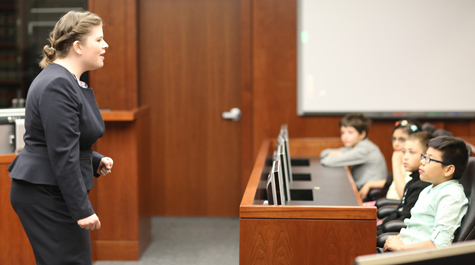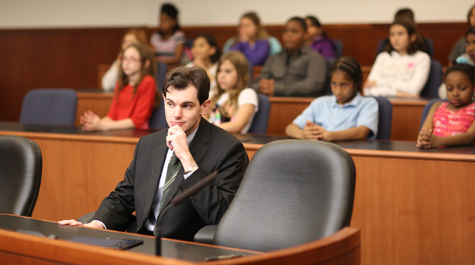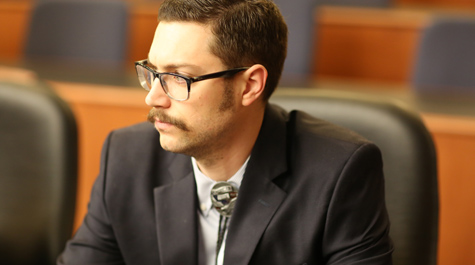Jack Pigge Convicted in Law School’s Fairy-tale Trial
Students from Matthew Whaley Elementary were treated to an in-person episode of Law & Order with a Brothers Grimm twist April 15 as the William & Mary Law School’s Center for Legal and Court Technology (CLCT) presented the case of Kingdom v. Pigge in the McGlothlin Courtroom.
The trial, part of the semiannual fairy tale trial series organized by the CLCT, is designed to give elementary school students an overview of American courtroom procedure through an accessible and entertaining fact pattern.
“We believe it’s very important that the people of the United States have a basic understanding of the legal system, and the easiest way to do that is to start when they’re very young and do it in a way they’ll enjoy and will entertain them,” said Fred Lederer, Chancellor Professor of Law and director of the CLCT.
According to Lederer, the fairy tale trial program has been going strong for over 20 years. Other jurisdictions, including Texas and parts of the Midwest, have requested the materials created at William & Mary and adapted them for local educational use.
The case opened with the prosecutor for the Kingdom, played by Kevin Bender J.D. ’16, presenting the facts to the jury of elementary students.
Jack Pigge, the defendant, was on trial for the attempted murder of Grey Wolfe, a door-to-door magazine salesman. Pigge, the Kingdom argued, wanted to make his family recipe of wolf stew and lured Wolfe into his brick home via the chimney because his door was broken — admittedly due to Wolf’s huffing and puffing during his sales pitch.
Ever the devoted salesman, the Kingdom continued, Wolfe entered the chimney and immediately slid down its greased interior, landing in a pot of boiling water — water that curiously contained carrots and celery — and severely burning his backside.
Defense counsel for Pigge, played by Allyson Keslar J.D. ’16, painted a different picture entirely.
“This is a story of a big, bad wolf and three little pigs,” she argued. “If someone came to your house and huffed, and puffed, and tried to blow your door down, how would you feel?”
The student jury then heard from a veritable menagerie of colorful witnesses played by other law students, including not only Wolfe and Pigge but also Jacques B. Nimble, a heavily accented French chef who moonlighted as Jack be Quick, the best wheel man in the Kingdom; Miss Piggé, Jack Pigge’s reporter cousin of questionable journalistic integrity; Lil’ Red, a flamboyant singer who seemed more interested in hawking her new album than offering testimony; and Sally, a humble merchant who sold sea shells by the sea shore.
Through their testimony, the jury was presented with bombshell revelations and cryptic clues that placed the question of Pigge’s guilt in a gray area.
For instance, the mild-mannered Wolfe was actually a werewolf — a protected species under Kingdom law — and the incident at Pigge’s home took place on the night of a full moon. But be Quick testified that Wolfe, one of his best customers, was a devout vegetarian.
But, to judge from the gasps and murmurs of the jury, the smoking gun was a Facebook post by Pigge with pictures of him greedily devouring a “Wolf Wrap Supreme” at a local restaurant.
“I knew I should not have posted that,” Pigge lamented on the stand, echoing so many other defendants whose social media indiscretions did them in.
Following closing arguments by the attorneys, Judge Lederer instructed the jury and gave them time to deliberate before taking their verdict through a count of hands.
Overwhelmingly, the Matthew Whaley jury found that Pigge had committed attempted murder.
“No — no! I’m not going back to the dungeons!” Pigge exclaimed, interrupting the judge as he handed down the sentence. The trial concluded with Pigge rushing out of the courtroom, followed closely by bailiffs in hot pursuit
“Ladies and gentlemen, that concludes our case. Thank you for your verdict,” Judge Lederer said to the startled jurors. “We are quite sure that we will be able to apprehend the defendant.”
Thomas Jefferson founded William & Mary Law School in 1779 to train leaders for the new nation. Now in its third century, America's oldest law school continues its historic mission of educating citizen lawyers who are prepared both to lead and to serve.


